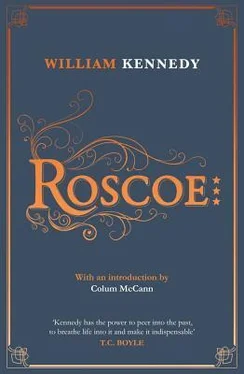“What the hell am I supposed to do about that?” said Patsy.
“Shut down,” said Al.
“No,” said Pat. “No. And also no.”
“Then why don’t you let somebody win once in a while?” Al said.
“Where do you suppose the Party gets its money?” Patsy said. “You think we carry the city and county for you by passing the hat on Pearl Street?”
“How much can you need? Why don’t you share some of the wealth? Even the communists do that.”
“I always knew you were a red,” Patsy said.
Al stood up and walked into the Mansion, slamming and bolting the door against intruders.
“Well, you won that one,” Roscoe told Patsy.
In spite of Al, it still seemed that Patsy’s dream of throwing a party for his own Governor in the Mansion might be taking shape. But then Goddard, on vacation in Havana early in ’28, fell out of an open limo, injured his head, developed toxemic erysipelas, and there was death, sitting on the front porch of Patsy’s Mansion dream. Hesitating not, Patsy picked Elisha as Goddard’s replacement for the nomination.
“I don’t want it,” Elisha said.
“You’re a natural for it,” Patsy said.
“I’m state chairman. That’s enough.”
“If we elect you we’ll own the goddamn state.”
“Who says you can elect me?”
“I do,” said Patsy.
“I don’t want it.”
“You’ll take it.”
“I don’t think so.”
“You’re throwing us all in?”
“Why don’t you run Roscoe?”
“And who’d run Albany if I did?”
“You.”
“I’m not smart enough,” Patsy said.
“Get somebody else to be Governor.”
“I got who I want.”
“I don’t want it.”
“You’ll get to like it.”
Al accepted Elisha as his successor, for a Protestant out of Yale would balance his major liability — his Roman Catholicism — in the presidential race. Also, Elisha had all the credentials. He was a prenatal Democrat, esteemed at all proper business and social levels, superb at running our Albany finances. As state chairman he was intimate with political leaders from Yonkers to Buffalo, heavily connected to old and new money everywhere. He and Al both had six million friends, both were known as honest men, Al with a somewhat saintly reputation despite his Tammany backing, Elisha considered too rich to be personally dishonest, and the two were pals even before the war: socialized with wives, sang in Mike Quinlan’s saloon together. For months we believed that Elisha, backed by Al, could make it.
These were heady developments for Elisha: roving state chairman, potential Governor. At the same time, Fitzgibbon Steel, with a flood of orders, was becoming another bright horizon. In 1927, Elisha and the Krupp Works of Germany had agreed to pool their patents for making new case-hardened alloy steel, with Fitzgibbon Steel holding sole U.S. rights. Elisha put a triumvirate — a cost accountant, his chief metallurgist, and the hustling Kyle Glockner — in charge of the busy mill and kept in touch with the business by remote control.
Elisha was focused on politics and living with a recklessness that was not entirely new, but more expansive than ever; and Roscoe sensed that for the first time in his marriage he was dabbling, beyond flirtation, in other women. Elisha confessed nothing to Roscoe, but affectionate ladies dogged his trail, and Roscoe now thinks that if he had carried on with Pamela, this was when it began. His luck was running very fast in all directions during this era of fabulous prosperity, and Elisha then did what gamblers and people with too much money usually do: try to make more.
He became a partner in Burdett and Company, a group of bankers and industrial toffs like himself, who created an investment trust that owned nothing except stock in varied corporations (Fitzgibbon Steel among them) on the stock exchange. You could buy into Burdett for ten dollars a share, and when the trust’s portfolio made money, so did you. In less than a year, Burdett’s shares were worth three times the stocks on which they were based. It was the purest kind of speculation, and Roscoe likened it to watching the profits compound from Patsy’s plugged baseball pool: another sure thing, blue-sky also, but with a difference; this was all legal, which is nice, and next year you’ll be as safely rich as your friends. We’re talking here about investing in the faith of people who believe that God, luck, and money go together. You can sell those folks anything.
Then, in the summer of 1928, Tammany and Al decided it was going to be a tough election year for Democrats, and they pressed FDR, the Party’s best candidate, who’d been the vice-presidential candidate in 1920, to give up his polio therapy and go for the governorship. And there FDR came, galloping into the home stretch without a leg to walk on; and that was that for Elisha and the rest of us. Elisha shed no tears. He’d said yes only because he didn’t know how to say no to Patsy, who was furious at Al. But it wasn’t Al. It was the age defining itself at Elisha’s and Al’s expense. Al won the greatest popular vote in Democratic presidential history, but the anti-Catholic vote did him in. He lost New York State to Hoover by more than a hundred thousand votes, while FDR won it by twenty-five thousand.
That year the ill wind blew through Elisha’s life. His five-year-old daughter, Rosemary, complained of a stomach ache and Veronica, as usual, gave her milk of magnesia. The child vomited for four hours, and when Dr. Deacy came to Tivoli he diagnosed appendicitis and said a laxative was a very wrong remedy. He arranged for immediate surgery at Albany Hospital. Six hours after the onset of her pain the child’s burst appendix was removed, and Elisha and Veronica took up a vigil at her bedside and waited for her to be comforted by the ministrations of doctors and nurses. But they could give her no comfort. Veronica sat at her side and watched the nurse come with a bottle that dripped new medication into Rosemary’s vein. On the next afternoon the child vomited blood, and her blood pressure plummeted. They put tubes in her stomach to wash out the blood, and gave her a transfusion. Her pressure returned to normal, her color came back, but her pain persisted.
Roscoe visited twice, but could find no function for himself beyond being here with a readiness to do anything. But there was nothing to be done. He went to Farnham’s and bought everybody turkey sandwiches with the homemade mayonnaise Veronica loved; but nobody ate them.
Dr. Deacy examined Rosemary and confirmed the fear: she had peritonitis, a toxic invasion of her system by its own poisons. She was in constant pain, with effortless vomiting and distended stomach; and when Roscoe heard the doctor whisper to a nurse that the child was critical and asked him what medicines were used to fight peritonitis, the doctor said there were many but none of them worked.
On the early morning of the third day, when Veronica could no longer sustain wakefulness, she closed her eyes against her will. Elisha had been catnapping for ten- and twenty-minute stretches, but Veronica could nap only a few minutes and would then burst back into wakeful vigil. This time she slept two hours, during which her daughter was released from relentless pain into shock.
Roscoe arrived to find a nurse scurrying out and Elisha weeping at the foot of the bed, staring at the shallow breathing of his unconscious daughter. The nurse returned with an intern and prepared new injections. Veronica, curled on a leather sofa too small for her body, was wakened by the frenzy of the doctor and nurse, and then realized she’d slept through the fading of her child’s consciousness. She threw herself down at the side of the bed, the crack of her knees on the floor a genuflection in hell, batted her head twice against the iron leg of the bed, raised her face and buried it in the bedsheet, and wailed and wept for her baby and cursed her husband.
Читать дальше












